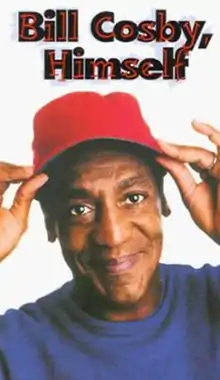Bill Cosby: Himself
Bill Cosby: Himself is a 1983 stand-up comedy film featuring Bill Cosby. Filmed before a live audience at Hamilton Place, in Hamilton, Ontario around 1982, Cosby gives the audience his views ranging from marriage to parenthood. The film also showcases Cosby's conversational style of stand up comedy. For most of the performance, Cosby is seated center-stage, only getting up to emphasize a joke.
| Bill Cosby: Himself | |
|---|---|
 | |
| Directed by | Bill Cosby |
| Produced by | Bill Cosby James B. Herring |
| Written by | Bill Cosby |
| Starring | Bill Cosby |
| Music by | Bill Cosby Stu Gardner |
| Cinematography | Joseph M. Wilcots[1] |
| Edited by | Ken Johnson, Steve Livingston[1] |
Production company | Jemmin, Inc. |
| Distributed by | 20th Century Fox |
Release date |
|
Running time | 105 minutes[2] |
| Country | United States |
| Language | English |
Many of the comedic routines presented in the film were precursors to Cosby's most popular sitcom, The Cosby Show. An album of the same name was also released on Motown Records.[3] The film was well regarded by comedians and critics, with some as calling it "the greatest stand up concert movie ever."[4]
Themes
Nearly all of Cosby's routine depicted in this movie concerns the trials and tribulations of parenting, frequently illustrated with anecdotes involving his own family. Occasionally, he compares these with stories from his childhood. Other themes include grandparents, going to the dentist (in which monologue he uses his "Mushmouth" speech pattern to imitate a dental patient anesthetized by Novocaine) and people who drink too much or take drugs.
Production
Written, directed, and produced, by Bill Cosby, Himself is a live comedy performance film.[5] It was made from the highlights of four shows at Hamilton Place Performing Arts Center, Ontario in May 1981.[6]
Reception
On Rotten Tomatoes the show has an approval rating of 80% based on reviews from 6 critics.[7]
Vincent Canby of The New York Times called it a "low-keyed and occasionally funny ramble through the star's life". Canby was critical of "a certain on-screen monotony" but puts it down to it being a recorded rather than a real live performance and "the interference of cinema technology."[5]
Bill Cassel of All Music Guide reviewed the album recording of the show argued that the audio only version brought "his total mastery of his art comes into sharper focus" and wrote that it was "a professional comedian at the top of his game, toying with structure, timing, and tone, holding his audience with absolute confidence." Cassel did note that "times have changed" and also that with hindsight the tragic death of Cosby's son Ennis changes the tone of some moments.[3]
In 2004 critic David Nusair gave it 2 out of 4. He said it was "overlong" and he found many of the anecdotes were not interesting. Nusair found Cosby's physical comedy to be an unnecessary distraction, from his excellent storytelling. He concludes that the show "would probably be best enjoyed by those who are already fans of Cosby's unique style of comedy, as the movie isn't always accessible to newcomers."[8]
Rob Gonsalves of eFilmCritic.com reviewed the show in 2015 and gave it 3 out of 5 over but was critical of Cosby for his judgmental style "Too much of the film is Cosby passing judgment, as if comedy weren't good enough anymore; he also has to tell us a thing or two." He notes that by that point Cosby's reputation had been irrevocably damaged but "Face it, he was always a dick."[9] Josiah Hesse of Vulture.com reviewed the film in 2015 with the intention of trying to appreciate the work on its own terms, but despite calling it "one of the greatest specials of all time" and "the nucleus of modern standup" found it impossible to separate the work from the man and appreciate it objectively.[10]
Awards
Rolling Stone listed it at #7 in its list of the 25 Best Stand-Up Specials.[11]
Home media
The film also saw success a success on home video, and by 1989 had already sold 350,000 units and was the number #1 best seller according to trade journal Home Video Publisher. It was priced at $19.99 compared to $30-40 price range of video cassettes in the years before when home video releases for comedy were less common.[12]
See also
References
- "Bill Cosby... Himself (1983)". BFI.
- "Bill Cosby -- "Himself"". AFI Catalog.
- Bill Cassel. "Bill Cosby Himself - Bill Cosby". All Music.
- "Comedians Salute the Stand-Up Comedy Classic Bill Cosby: Himself". GQ.
- Canby, Vincent (21 May 1983). "BILL COSBY'S HIGHLIGHTS (Published 1983)". The New York Times.
- "SHOWS FOR YOUNGSTERS AND THEIR PARENTS TOO : New adventure in Robin's 'Hood' on TNT; a 1981 Cosby concert on Showtime". Los Angeles Times. 2 March 1997.
1981, during a concert taped before a live audience in Ontario, Canada. For the family.
- "Bill Cosby: Himself (1982)". Rotten Tomatoes. Retrieved 2021-02-01.
- "Bill Cosby "Himself" (1982) - A Review by David Nusair". Reelfilm.com. October 25, 2004.
- "Movie Review - Bill Cosby: Himself - eFilmCritic". www.efilmcritic.com.
- Hesse, Josiah (9 September 2015). "I Tried To Watch Cosby's 'Himself' Objectively, and Failed". Vulture.com. New York Magazine.
- "Divine Comedy: 25 Best Stand-Up Specials and Movies". Rolling Stone. 29 July 2015.
- "HOME VIDEO : Comedy Tapes Look Like Contenders". Los Angeles Times. 1 September 1989.